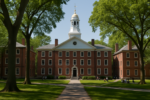April 16, 2025 – Cambridge, MA – In an unprecedented move, Harvard University has openly defied the Trump administration’s sweeping demands, setting the stage for a landmark legal battle that could redefine the boundaries of federal authority over academic institutions. The university’s resistance centers on issues of academic freedom, constitutional rights, and the extent of governmental power.
🏛️ Harvard’s Stand Against Federal Overreach
The Trump administration has issued directives aimed at reshaping American higher education, including:
- Imposing surveillance and reporting measures targeting foreign students critical of Israel.
- Mandating the appointment of external supervisors to ensure ideological diversity within certain departments.
- Altering admissions and hiring practices to align with the administration’s policies.
In response, Harvard President Alan Garber declared that the university would not compromise its independence or constitutional rights, stating that the government’s demands are “unmoored from the law” and infringe upon academic freedom .
💰 Financial Repercussions and Institutional Resilience
As a consequence of its defiance, Harvard faces significant financial penalties, including the freezing of over $2.2 billion in federal grants and $60 million in contracts . The administration has also threatened to revoke the university’s tax-exempt status .
Despite these challenges, Harvard’s substantial $53 billion endowment provides a buffer, allowing the institution to maintain operations and uphold its principles.
🗣️ National Support and Broader Implications
Harvard’s stance has garnered support from various quarters, including former President Barack Obama, who praised the university for resisting what he described as an unlawful attempt to suppress academic freedom .Vanity Fair
This confrontation has prompted other elite institutions, such as Columbia University, to reconsider their positions, highlighting a growing tension between academic freedom and federal oversight .
📝 Conclusion
Harvard’s defiance of the Trump administration’s demands marks a pivotal moment in the ongoing debate over the role of government in higher education. The outcome of this legal battle could have far-reaching implications for academic freedom and the autonomy of educational institutions across the United States.









